Panel vote sends Donald Trump impeachment charges to full House
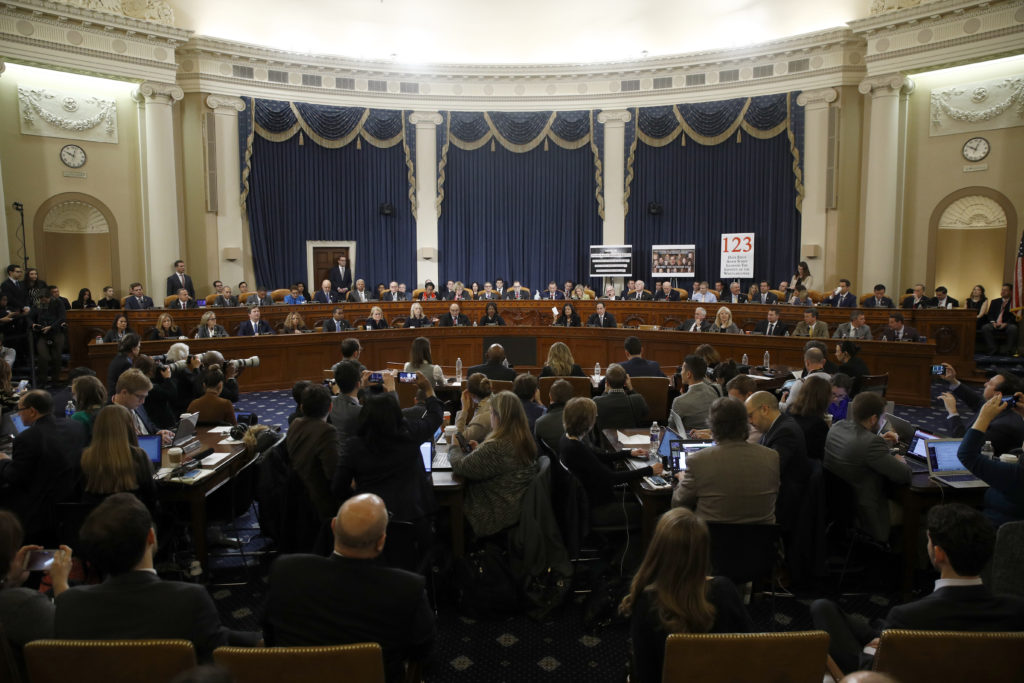
Democrats propelled President Donald Trump’s impeachment toward a historic vote by the full U.S. House on Friday, as the Judiciary Committee approved charges of abuse of power and obstruction of Congress. It’s the latest major step in the constitutional and political storm that has divided Congress and the nation. The House is expected to approve the two articles of impeachment next week, before lawmakers depart for the holidays. The partisan split in the committee vote — 23 Democrats to 17 Republicans — reflects the atmosphere in Congress. The Democratic-majority House is expected to approve the charges against Trump next week, but the Republican-controlled Senate is likely to acquit him after a January trial. Trump is accused, in the first article, of abusing his presidential power by asking Ukraine to investigate his 2020 rival Joe Biden while holding military aid as leverage, and, in the second, of obstructing Congress by blocking the House’s efforts to probe his actions. “Today is a solemn and sad day,” Chairman Jerrold Nadler, Democrat-New York, told reporters after the session, marking the third time in U.S. history the panel had voted to recommend impeaching a president. He said the full House would act ”expeditiously.”‘ After the milestone votes, Trump’s press secretary, Stephanie Grisham, labeled the proceedings a “desperate charade” and said, “The President looks forward to receiving in the Senate the fair treatment and due process which continues to be disgracefully denied to him by the House.” Voting was swift and solemn, with none of the fiery speeches and weighty nods to history that have defined the previous debating, including 14 hours that stretched nearly to midnight Thursday. Nadler abruptly halted that session so voting could be held in daylight, for all Americans to see. Nadler, who had said he wanted lawmakers to “search their consciences” before casting their votes, gaveled in the landmark but brief morning session. Lawmakers responded “aye” or “yes” for the Democrats, and simple:”no’s” from the Republicans. “The article is agreed to,” Nadler declared after each vote. The top Republican on the panel Rep. Doug Collins of Georgia immediately said he would file dissenting views. Minutes after the morning session opened, it was gaveled shut. Trump is only the fourth U.S. president to face impeachment proceedings and the first to be running for reelection at the same time. The outcome of the eventual House votes pose potentially serious political consequences for both parties ahead of the 2020 elections, with Americans deeply divided over whether the president indeed conducted impeachable acts and if it should be up to Congress, or the voters, to decide whether he should remain in office. The outcome came quickly after two days of hearings at the Capitol and the rancorous 14-hour session that was shut down when the Democratic majority refused to be forced, after a long and bitter slog through failed Republican amendments aimed at killing the impeachment charges, into midnight voting. Instead, the impeachment charges against Trump were aired in full view. Trump took to Twitter early Friday to praise the panel’s Republicans, saying “they were fantastic yesterday.” “The Dems have no case at all, but the unity & sheer brilliance of these Republican warriors, all of them, was a beautiful sight to see,” he tweeted. “Dems had no answers and wanted out!” The president has refused to participate in the proceedings, tweeting criticisms as he did Thursday from the sidelines, mocking the charges against him in the House’s nine-page resolution as “impeachment light.” But House Speaker Nancy Pelosi said the president was wrong and the case against him is deeply grounded. Democrats contend that Trump has engaged in a pattern of misconduct toward Russia dating back to the 2016 election campaign that special counsel Robert Mueller investigated. And they say his dealings with Ukraine have benefited its aggressive neighbor Russia, not the U.S., and he must be prevented from “corrupting” U.S. elections again and cheating his way to a second term next year. “It is urgent,” House Speaker Nancy Pelosi said. But Senate Majority Leader Mitch McConnell said late Thursday on Fox News, “There is zero chance the president will be removed from office.” He said he was hoping to have no GOP defections in the Senate trial next year. The Judiciary Committee session drew out over two days, much of time spent in fights over amendments. After lawmakers trudged through two days of hearings, tempers still flared Friday. “My vote is no,” said Rep. Louie Gohmert, Republican-Texas. Then, before the tally was announced, he inquired how his vote was recorded by the clerk. “I want to make sure.” Later he echoed Trump’s criticism of the proceedings: “It was a witch hunt.” Florida GOP Rep. Matt Gaetz said, “For Democrats, impeachment is their drug, it is their obsession, it is their total focus.” Nadler said late Thursday night, after presiding over the two-day session, “I want the members on both sides of the aisle to think about what has happened over these past two days and to search their consciences before they cast their final votes.” The Republicans on the panel, blindsided by the move to Friday, were livid. When Nadler announced it, they started yelling “unbelievable” and “they just want to be on TV.” Congress was to be out of session on Friday, and many lawmakers had other plans, some outside Washington. “This is the kangaroo court that we’re talking about” stormed Rep. Doug Collins of Georgia, the top Republican on the panel, who said he had not been consulted on the decision. Debate over amendments had dragged on with familiar arguments: Democrats cited evidence they said showed Trump’s misconduct, while Republicans insisted the entire investigation was bogus. Typical was the first amendment, offered by GOP Rep. Jim Jordan of Ohio, who tried to delete the first charge against Trump. “This amendment strikes article one because article one ignores the truth,” he declared. Rep. David Cicilline, Democrat-Rhode Island, argued there was “overwhelming evidence” that the president with his lawyer Rudy Giuliani, in pushing Ukraine to investigate rival Biden, was
Congress pushes ahead on Donald Trump impeachment with nation split
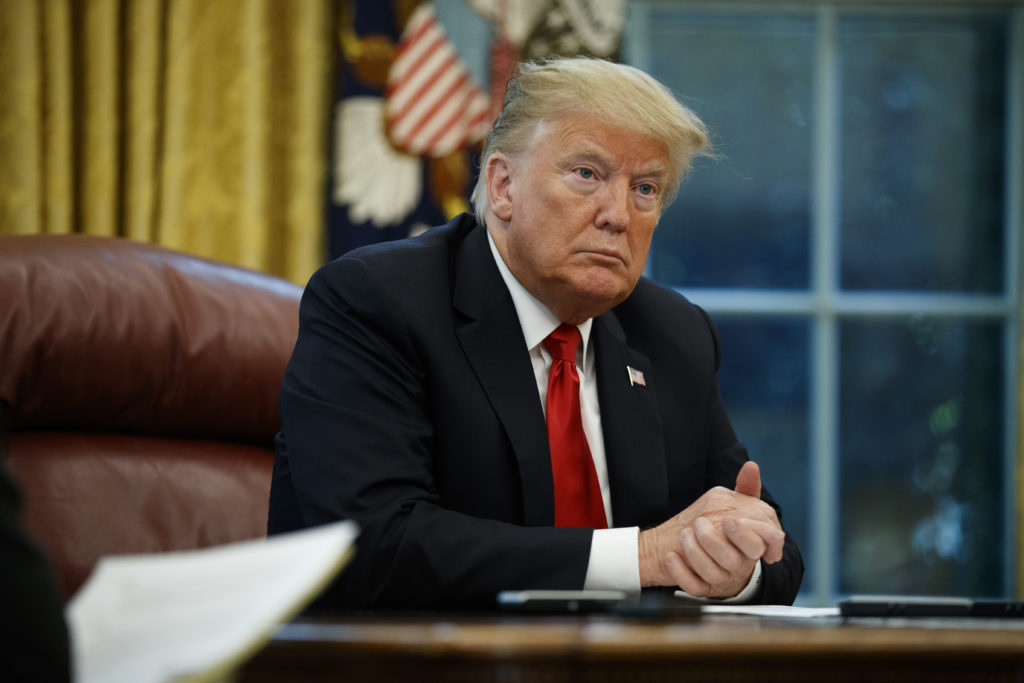
The House is plunging into a landmark impeachment week, with Democrats who once hoped to sway Republicans now facing the prospect of an ever-hardening partisan split over the question of removing President Donald Trump from office. Lawmakers were getting their first look at the House Intelligence Committee’s impeachment report Monday night behind closed doors. The findings are expected to forcefully make the Democrats’ case that Trump engaged in what Chairman Adam Schiff calls impeachable “wrongdoing and misconduct” in pressuring Ukraine to investigate Democrats and Joe Biden while withholding military aid to the ally. For Republicans offering an early rebuttal ahead of the report’s public release, the proceedings are simply a “hoax,” with Donald Trump insisting he did nothing wrong and his GOP allies in line behind him. Trump tweeted his daily complaints about it all and then added a suggestive, if impractical, question: “Can we go to Supreme Court to stop?” With the Judiciary Committee set to launch its first hearing Wednesday, the impeachment proceedings are presenting a historic test of political judgment in a case that is dividing Congress and the country. Departing for a NATO meeting in London, Trump criticized the House for pushing forward Monday with proceedings while he was heading overseas, a breach of political decorum that traditionally leaves partisan differences at the water’s edge. He predicted Republicans would actually benefit from the entire impeachment effort against him, though “it’s a disgrace for our country.” For the Democrats, House Speaker Nancy Pelosi faces a critical moment of her leadership as she steers the process ahead after resisting the impeachment inquiry through the summer, warning it was too divisive for the country and required bipartisan support. Speaking to reporters at the international climate conference in Madrid, Pelosi declined to engage with impeachment questions. “When we travel abroad, we don’t talk about the president in a negative way,” she said. “We save that for home.” Possible grounds for impeachment are focused on whether Trump abused his office as he pressed Ukrainian President Volodymyr Zelenskiy in a July 25 phone call to launch investigations into Trump’s political rivals. At the time, Trump was withholding $400 million in military aid, jeopardizing key support as Ukraine faced an aggressive Russia at its border. The report, which the Intelligence panel will vote on Tuesday and make public, also is expected to include evidence the Democrats say suggests obstruction of Congress, based on Trump’s instructions for his administration to defy subpoenas for documents and testimony. The next step comes when the Judiciary Committee gavels open its own hearing with legal experts to assess the findings and consider potential articles of impeachment ahead of a possible vote by the full House by Christmas. That would presumably send it to the Senate for a trial in January. The Democratic majority on the Intelligence Committee says its report, compiled after weeks of testimony from current and former diplomats and administration officials, will speak for itself in laying out the president’s actions toward Ukraine. Republicans pre-empted the report’s public release with their own 123-page rebuttal. In it, they claim there’s no evidence Trump pressured Zelenskiy. Instead, they say Democrats just want to undo the 2016 election. Republicans dismiss witness testimony of a shadow diplomacy being run by Trump lawyer Rudy Giuliani, and they rely on the president’s insistence that he was merely concerned about “corruption” in Ukraine — though the White House transcript of Trump’s phone call with Zelenskiy never mentions the word. “They are trying to impeach President Trump because some unelected bureaucrats chafed at an elected President’s ‘outside the beltway’ approach to diplomacy,” according to the report from Republican Reps. Devin Nunes of California, Jim Jordan of Ohio and Michael McCaul of Texas. Rep. Jim Jordan, Republican-Ohio, appeared to be the only lawmaker who viewed the Democratic report Monday evening when it became available behind closed doors for members of the intelligence panel. He said it was “long.” Jordan declined to discuss details, but said it’s the same “lame case” Democrats presented throughout impeachment hearings. “The president did nothing wrong,” Jordan said. “The facts are on our side.” Trump on Monday pointed to Zelenskiy’s recent comments as proof he did nothing wrong. The Ukrainian president said in an interview he never talked to Trump “from the position of a quid pro quo,” but he didn’t say Trump did nothing wrong. In fact, he had strong criticism for Trump’s actions in the Time magazine interview. With Ukraine at war with Russia, he said, its partners “can’t go blocking anything for us.” Schiff said the GOP response was intended for an audience of one, Trump, whose actions are “outside the law and constitution.” The finished Intelligence Committee report sets up the week’s cascading actions. Democrats could begin drafting articles of impeachment against the president in a matter of days, with voting in the Judiciary Committee next week. Republicans on the committee, led by Rep. Doug Collins of Georgia, plan to use procedural moves to stall the process and portray the inquiry as unfair to the president. The White House declined an invitation to participate, with Counsel Pat Cipollone denouncing the proceedings as a “baseless and highly partisan inquiry” in a letter to Judiciary Chairman Jerrold Nadler, Democart-New York. Trump had previously suggested that he might be willing to offer written testimony under certain conditions, though aides suggested they did not anticipate Democrats would ever agree to them. Cipollone’s letter of nonparticipation applied only to the Wednesday hearing, and he demanded more information from Democrats on how they intended to conduct further hearings before Trump would decide whether to participate. Nadler said Monday if the president really thought his call with Ukraine was “perfect,” as he repeatedly says, he would “provide exculpatory information that refutes the overwhelming evidence of his abuse of power.” House rules provide the president and his attorneys the right to cross-examine witnesses and review evidence before the committee, but little ability to bring forward witnesses of their own. Asked why not have his lawyers participate, Trump said
Impeachment Probe to be Considered by Judiciary Committee
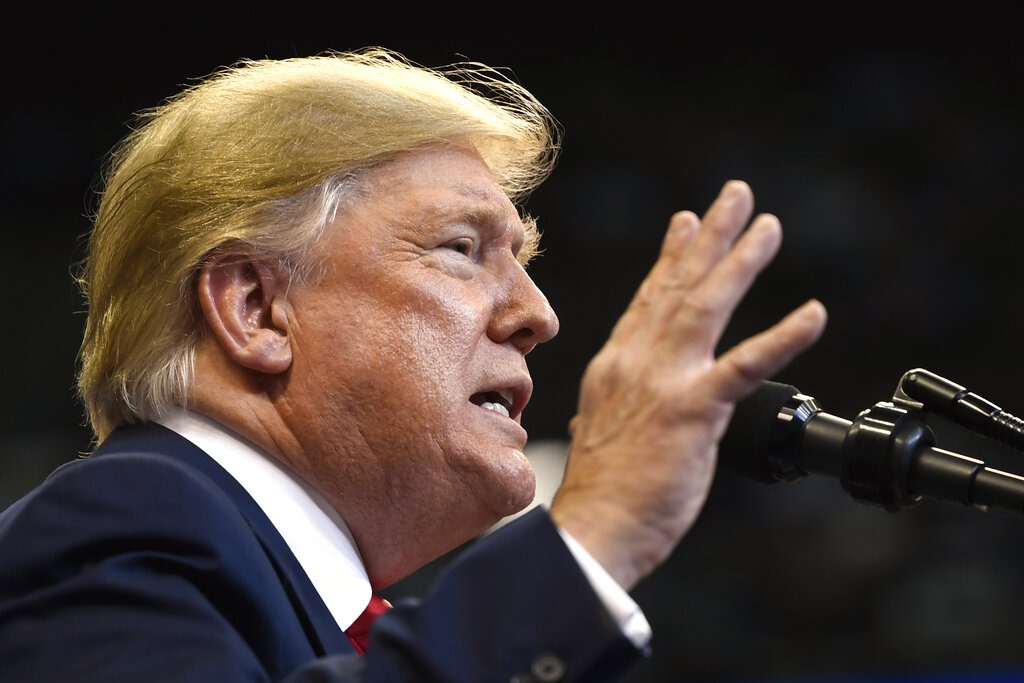
The exact grounds of a possible impeachment have not yet been determined.
Is it impeachment if Speaker Nancy Pelosi doesn’t say so?
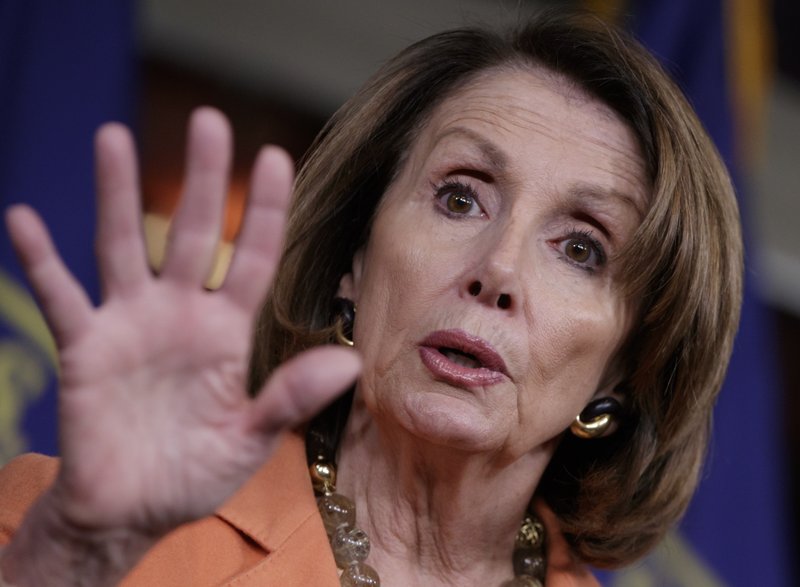
Bristling over the “I” word, House Speaker Nancy Pelosi stopped short Thursday of saying the House is ready to launch an impeachment investigation of President Donald Trump, even as Judiciary Committee Democrats set the stage to do just that. Pelosi has been a moderating force in her divided caucus, as liberals push to impeach and centrist Democrats are wary of fixating on Trump. She’s been consistent in her restraint. But in having it both ways, opening the door to impeachment while not leading the charge, she was giving space for different opinions but leaving Democrats with a mixed message . By approving ground rules for impeachment hearings Thursday, the Judiciary Committee sparked the questions anew. “If we have to go there, we’ll have to go there,” Pelosi said Thursday about the impeachment investigation. “But we can’t go there until we have the facts.” Pelosi cut off repeated questions on the topic during her weekly press conference. She said she was done discussing it. “People are impatient about it,” she conceded. “We can’t go any faster than the facts.”She said, “We’re still on the same path.” The approach from Pelosi and her leadership team comes as the Judiciary Committee pushes ahead with its first impeachment hearings this fall, backed by more than half the House Democrats who want some sort of an investigation. Judiciary Committee Chairman Jerrold Nadler says there’s no uncertainty about what his committee is doing: It’s an impeachment investigation, no matter how you want to phrase it. As the committee voted Thursday to approve guidelines for impeachment hearings, Nadler promised an “aggressive” fall schedule, starting with next week’s public session with Trump aide Corey Lewandowski. “Some call this process an impeachment inquiry. Some call it an impeachment investigation. There is no legal difference between these terms, and I no longer care to argue about the nomenclature,” Nadler, Democrat-New York, said earlier as he opened the meeting. “But let me clear up any remaining doubt: The conduct under investigation poses a threat to our democracy. We have an obligation to respond to this threat. And we are doing so.” Impeachment has divided Democrats who control the House, a split that is becoming even more pronounced ahead of the 2020 election as the party measures the weight of its oversight responsibility with the mood of public opinion. Democrats on Nadler’s committee, including some of the most liberal members of the House, have been eager to move forward with the process. But moderates, mostly first-term lawmakers who handed their party the majority in the 2018 election, are concerned about the committee’s drumbeat on impeachment especially in districts where Trump remains popular. Given those divisions, Nadler and Pelosi have been talking about impeachment very differently. While Nadler has been clear that his committee is moving ahead, Pelosi is reluctant to mention the “I” word. In private meetings, Pelosi has urged caution and told the caucus that the public isn’t there yet on impeachment. At the same time, Pelosi has quietly signed off on the committee’s moves and said Thursday she supports its work. She said Thursday that when she travels the country, “people are saying it’s good to be careful about how we proceed.” Outside groups that spent the month of August flooding lawmakers’ telephone lines and showing up at town hall meetings to push impeachment find Pelosi’s approach out of step with the party’s priorities. “It’s just an absurd position,” said Zac Petkanas, a Democratic strategist and president of Defend the Republic, a messaging group around the issue. He is a former campaign aide to Hillary Clinton. Petkanas said the “discombobulation of some of the leadership messaging is disappointing,” but not a blow to the efforts to push Judiciary Committee Democrats to act. “It kind of doesn’t even matter what she calls it, they’re doing the thing.” The confusion was highlighted this week as leadership split on what to call what was happening. Majority Leader Steny Hoyer, Democrat-Maryland, indicated to reporters that there was not an impeachment investigation — and then issued a clarification saying the House is not considering one “at this time.” The caucus chairman, Rep. Hakeem Jeffries, Democrat-New York, tweeted that committee adopted the resolution for the “IMPEACHMENT INVESTIGATION.” Ahead of the committee vote, several freshman lawmakers met with Nadler on Wednesday and expressed concerns about the path ahead. Hoyer’s office had encouraged them to raise their questions. “It’s sucking the air out of all the good stuff that we’re doing, so that’s our concern,” said Florida Rep. Donna Shalala, who attended the meeting. As soon as the committee voted Thursday, the House GOP’s campaign committee began singling out Democratic freshmen who voted for the resolution, warning they will “pay dearly for this decision at the ballot box.” With Democrats divided and the 2020 campaign ahead, it’s unclear whether the impeachment process will ever move beyond the committee’s investigation. The Republican-led Senate is unlikely to convict Trump and remove him from office. The GOP’s House leader, Rep. Kevin McCarthy of California, a close ally of Trump, said there’s “no reason’ to move forward with impeachment. “This is not something to play with,” he said. Still, the committee has persisted in advancing the issue, keeping questions swirling about Trump’s actions in office. Its work is also intended to bolster the Democrats’ lawsuits against the Trump administration to force witness testimony and documents as the White House has repeatedly blocked both. The committee says the resolution approved Thursday is similar to the approach taken at the beginning of the impeachment investigations into Presidents Richard Nixon and Bill Clinton. The first hearing scheduled under the new impeachment rules is with Lewandowski, the former Trump campaign manager, on Sept. 17 over questions of obstruction of justice. According to special counsel Robert Mueller’s report , Trump asked Lewandowski to deliver a message to then-Attorney General Jeff Sessions requesting that he limit Mueller’s inquiry. The committee also intends to hold hearings as it is investigating the spending of taxpayer money at the president’s
‘It will not be easy’: Dems prepare for their Robert Mueller moment
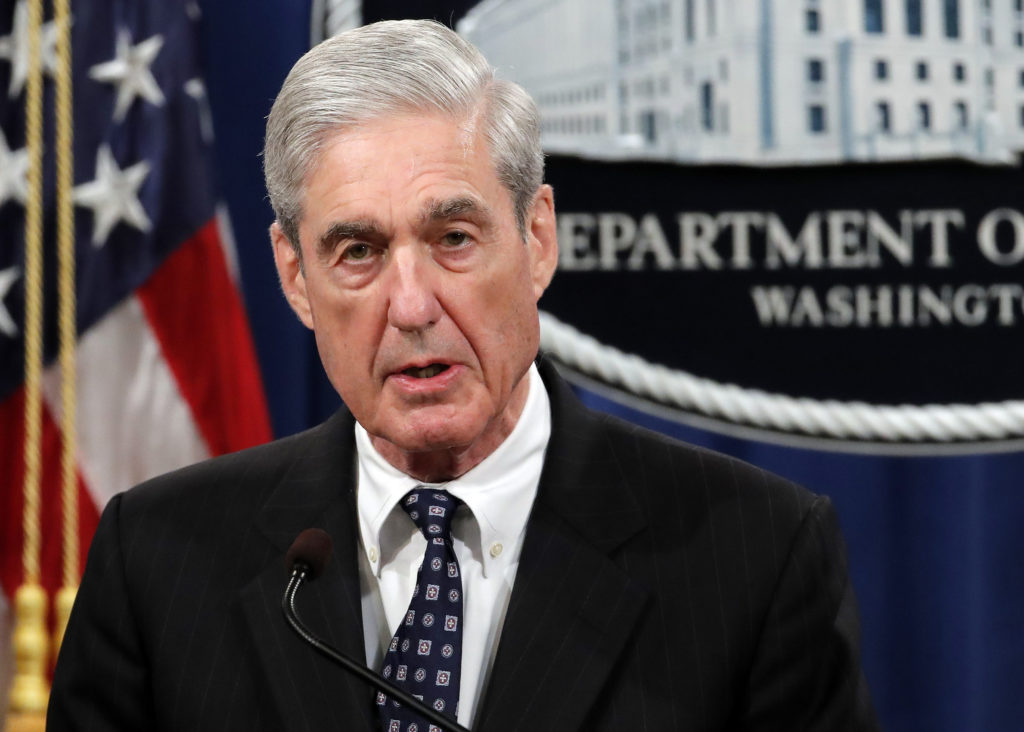
Some are watching old video of his previous testimony. Others are closely re-reading his 448-page report. And almost all are worrying about how they’ll make the most of the short time they’ll have for questioning.Robert Mueller, the Democrats know, will be tough to crack. The stern, reticent former FBI director has said he won’t answer questions beyond what is in the report on Russia’s election meddling and the Trump campaign and possible obstruction of justice when he comes to Congress on July 17. Mueller is expected to testify in front of the Judiciary and intelligence committees for two hours each, with time split evenly between Republicans and Democrats, though that timing is still a subject of negotiations. That means Democrats will have to be efficient and targeted in their attempts to extract information from the former special counsel and spotlight what they say are his most damaging findings against President Donald Trump. “It will not be easy,” said Rhode Island Rep. David Cicilline, a Democratic member of the Judiciary Committee. He added: “We just have to be very smart about how we use the time and really give the special counsel the time to tell the story.” Cicilline says he’s reading the report a second time, thoroughly, with an eye toward what he wants to ask. Separately, a Democratic aide said staff members have been watching old videos of Mueller testifying as FBI director during the administrations of Presidents George W. Bush and Barack Obama. They’re looking to see how he’ll act, the aide said, and they have noticed he gives minimal commentary when answering questions. The aide was not authorized to discuss internal preparations for the hearing and requested anonymity. Wary of their challenging witness, Democratic members of the Judiciary Committee huddled Wednesday evening to discuss strategy for questioning Mueller, along with other topics. Exactly how the hearing will be structured is still being negotiated, members said as they emerged, but Democrats are expected to divvy up the questions in a methodical way. Among the topics up for discussion as the hearing approaches: Should they work through the report step by step, or paint a general picture? Will every member be able to speak in the short time they have? And what can they do to best crystalize the findings of a report that they believe Americans haven’t read or absorbed? New York Rep. Hakeem Jeffries, a member of the panel, said before the meeting that he expects to discuss “what the team strategy is going to be as we begin an intensive phase of preparation.” Republicans seem to have given it less thought. Ohio Rep. Steve Chabot, a senior GOP member of Judiciary, said he hasn’t started preparing and expects little news from the event. He said Democrats are just “chasing their tails” and are aiming to placate base voters who want to see the Democratic House majority take on the president. “It’s possible a few people could change their opinion, but overall I think it’s not likely,” Chabot said. The Judiciary Committee is expected to focus on the second half of Mueller’s report, which details multiple episodes in which Trump attempted to influence the investigation. Mueller said he couldn’t exonerate the president on obstruction of justice. The House’s intelligence panel, which will go second, will focus on the first half of the report, which details Russian interference in the presidential election. Mueller said there wasn’t enough evidence to establish a conspiracy between Russia and the Trump campaign, but detailed several contacts between the two as well as the Trump campaign’s willingness to accept Russian help. Under a deal struck with the committees, two of Mueller’s deputies — James Quarles and Aaron Zebley — are expected to meet with the panels in separate closed sessions after Mueller’s public hearing. But that might be in jeopardy as the Justice Department has pushed back on the arrangement, according to two people familiar with the negotiations. They requested anonymity to discuss the private talks. The chairman of the intelligence panel, Rep. Adam Schiff, Democrat-California, said Tuesday said he wouldn’t discuss the details of those negotiations, but that the deputies have agreed to appear and “I have no reason to believe that will be unsuccessful.” One issue that Judiciary members are expected to focus on is whether Mueller will state whether Trump would have been charged with a crime were he not president. Jeffries said that answer could “strike to the heart of why a prosecution or recommendation to prosecute wasn’t included in the report.” Mueller said at a May news conference that charging a president with a crime was “not an option” because of longstanding Justice Department policy. But Democrats want to know more about how he made that decision, and when. It’s unclear if he will go beyond his previous comments. Mueller, who was reluctant to testify at all, has been firm that he will stick to what’s already in the report. Some lawmakers say that’s OK and just want to reach a broader audience of Americans who they fear have tuned out. “This isn’t a question of creating a narrative,” said Florida Rep. Ted Deutch, another Democrat on the Judiciary Committee. “The narrative is already out there. It’s simply highlighting what is already there.” By Mary Clare Jalonick and Lisa Mascaro Associated Press Associated Press writer Michael Balsamo contributed to this report. Republished with the permission of the Associated Press.
Women of Influence: U.S. Representative Martha Roby

Arguably, one of the most politically influential women in the state, 2nd District U.S. Rep. Martha Roby has been hard at work; serving the state of Alabama, and the members of her district for fifteen years. Roby was born and raised in Montgomery Ala.. After receiving her Bachelors degree in music from New York University in 1998, she returned to the Yellowhammer state to pursue a law degree at the Cumberland School of Law at Samford University in Birmingham, Ala. Roby and her (now) husband Riley, were attending her younger brother’s graduation ceremony in Montgomery while she was in her third year at Samford, when the commencement speaker caught her attention. “He challenged the graduates not to contribute to Alabama’s ‘brain drain,’ a long-existing problem in which young, talented Alabamians leave the state to follow their ambitions elsewhere. ‘Invest in Alabama,’ he said. ‘Chase your dreams, but whenever possible, contribute to building up your home and making it a better place,’” Roby told Lean IN. “How many bright, talented individuals had we seen leave the state to pursue careers in so-called greener pastures? Montgomery and the State of Alabama had hard-to-fix problems. Would it make the difference if Riley and I, who care deeply about our home, put down roots?” Roby continued. “Ambition to follow one’s dreams is admirable, I thought, but so is realizing a responsibility to stay and help lift up a community. If we didn’t, who would?” After finishing law school, Roby’s mind raced with possibilities on how she could serve those in her community; and her opportunity came just a few short years later when a local city council member announced her retirement. She entered the race, and won the Montgomery City Council District 7 seat in 2003. A position she maintained until 2010, when she announced her run for U.S. Congressional District 2. Winning the race in 2010, Roby has since served her constituents in the 2nd District with an enthusiasm that’s hard to match. Roby is a former member of several congressional committees including the Subcommittee on Military Construction, Veterans Affairs and Related Agencies and currently serves as a member of the Judiciary committee, the Subcommittee on Commerce, Justice, Science, and Related Agencies, Subcommittee on Crime, Terrorism, Homeland Security, and Investigations, Subcommittee on Defense, Subcommittee on Labor, Health and Human Services, Education, and Related Agencies, and is the first representative from the 2nd Congressional District to serve on the House Appropriations Committee. She also serves on many non-legislative committees including the Caucus for Womens Issues, Congressional Army Aviation Caucus, Congressional Pro-life Caucus and the Congressional Air Force Caucus. Roby has been instrumental in bringing jobs, and investments to her district, including fighting to keep eight C-130 aircrafts at Montgomery’s Maxwell Air Force Base, and working in Congress to help the Army Aviation Center of Excellence at Fort Rucker avoid crippling budget cuts that would have decimated training capabilities. She has also been a proponent of Veterans Affairs and has worked tirelessly to address some of the misconduct at the Central Alabama Veterans Health Care System (CAVHCS). Roby is a women who has dedicated her life in-service to the state of Alabama. She works endlessly for those in her District and across the nation, and was kind enough to answer some of Alabama Today’s questions about her life, work and influences. How have other women influenced your success? I am blessed to have been surrounded by strong, driven women – my mom, my grandmothers, and others. Growing up, my dad always told me, “You can be anything you want to be.” I believed him, and I was fortunate to see this truth lived out by women in my life. What shaped your desire to work in politics? My husband Riley and I were sitting in the audience at my brother’s high school graduation, and the commencement speaker talked about the “brain drain.” He mentioned how important it is to go out into the world and do all the things you dream of doing, but then to return home to serve your community in whatever way you feel called. The challenge had a profound effect on both of us. Shortly thereafter I kicked off my first campaign in my hometown for the Montgomery City Council. Later, when my husband and I were debating and praying about whether or not to run for Congress, we sought the advice of countless people, many of whom had done this job before or were currently serving. I had a four-year old and a twelve-week old, and when asked, most people told me I shouldn’t run for Congress – that I wouldn’t be able to do it. Before officially announcing my bid for Congress, I visited Washington, D.C., and had the opportunity to sit down with my now great friend and colleague, Cathy McMorris Rodgers (R-WA). I told her my dilemma, and I told her that most people had encouraged me not to run due to the stresses associated with being young mom. I knew Cathy had recently had her first child, and she now has three beautiful children. She looked at me and said, “You can do this.” I took her advice. To this day, she inspires me, and I am grateful to call her a friend. What has been your favorite area of service, and what is your favorite thing about that position? I truly love this job, and because of that, I have several favorite areas of service. Perhaps both my biggest responsibility and greatest joy in Congress is being in a position to fight for proper treatment for our nation’s veterans. We owe the men and women who have put their lives on the line in service to this great country the absolute best care available, but far too often we fall short. I remain committed to advocating for commonsense solutions to make the Department of Veterans Affairs work for veterans. Have you read any books that have shaped your perspective on life? I am an avid reader. While I have
Judiciary panel votes 11-9 in favor of Neil Gorsuch

The Latest on the nomination of Judge Neil Gorsuch to the Supreme Court (all times local): 2:35 p.m. A divided Senate panel is backing Supreme Court nominee Neil Gorsuch. The Judiciary Committee voted 11-9 along party lines on Monday to favorably recommend Gorsuch to the full Senate. A confirmation vote is expected on Friday, but not before a partisan showdown over President Donald Trump‘s choice. Democrats have secured the 41 votes to block Gorsuch with a filibuster after Delaware Sen. Chris Coons said he would vote against the nominee. The opposition will prevent Republicans from reaching the 60 votes they need to move Gorsuch over procedural hurdles to a final Senate vote. Determined to confirm him despite Democratic objections, Majority Leader Mitch McConnell has signaled he will likely change Senate rules later this week to reduce the threshold from 60 to a simple majority to get Gorsuch confirmed. ___ 1:25 p.m. Senate Democrats now have enough votes to try to block Supreme Court nominee Neil Gorsuch with a filibuster, setting up a showdown with Republicans who plan to confirm him anyway. The crucial 41st vote came from Democratic Sen. Chris Coons of Delaware who announced his decision Monday as the Senate Judiciary Committee met to vote on Gorsuch’s nomination. Coons said that he had decided to oppose President Donald Trump’s nominee over concerns that include his vague answers in his hearing. Coons’ opposition will prevent Republicans from reaching the 60 votes they need to move Gorsuch over procedural hurdles to a final Senate vote. Determined to confirm him despite Democratic objections, they will likely change Senate rules later this week to reduce the threshold from 60 to a simple majority. __ 11:45 a.m. Senator Michael Bennet says he will not join Democratic efforts to block a full-Senate vote on the nomination of Judge Neil Gorsuch to the Supreme Court. The Colorado Democrat has been under pressure to support Gorsuch in part because the nominee is also from Colorado. Bennet doesn’t say whether he will ultimately vote in favor of Gorsuch. But he says he will not try to block a vote. If Democrats successfully block a vote on Gorsuch, Senate Republicans are threatening to change Senate rules to enable them to confirm a Supreme Court nominee with a simple majority of 51 votes. Under current rules, the need 60 votes to end debate. Bennet says, “Changing the Senate rules now will only further politicize the Supreme Court.” ___ 11:35 a.m. Senator Lindsay Graham says flatly that Republicans will change the Senate’s rules if Democrats use a filibuster to block the nomination of Judge Neil Gorsuch to the Supreme Court. Under current rules, Supreme Court nominees need at least 60 votes to end debate and hold a vote on their confirmation. So far, 40 Democrats have publicly said they will try to block Gorsuch’s nomination. That’s just one shy of the number needed to stop the nomination under current Senate rules. The South Carolina Republican says his GOP colleagues will change the rules to enable them to confirm a Supreme Court nominee with a simple majority of 51 votes. Graham says: “The Senate’s traditions are going to change over this man. This says more about the Senate than it does Judge Gorsuch.” ___ 11:15 a.m. Senators Mark Warner and Patrick Leahy say they will vote against the nomination of Judge Neil Gorsuch to the Supreme Court. The two Democrats are the 39th and 40th senators to say they will try to block Gorsuch’s nomination. That’s just one shy of the number needed to stop the nomination under current Senate rules. The nomination needs 60 votes to succeed. However, Senate Republicans are threatening to change Senate rules to enable them to confirm a Supreme Court nominee with a simple majority of 51 votes. All 52 Republicans are expected to support the Gorsuch. ___ 10:45 a.m. Senator Dianne Feinstein says she will vote against the nomination of Judge Neil Gorsuch to the Supreme Court. The California Democrat cited two cases in which, she says, Gorsuch inserted his own view of what the law should be. In one case Gorsuch sided with a trucking company over a fired trucker who refused to drive a disabled truck in subzero weather. In the other case, Gorsuch sided with a school district that denied services to a student with autism. Feinstein also says she is troubled that Gorsuch refused to say whether he supports the outcome of Brown v. Board of Education, the court decision that ended racial segregation in public schools. Feinstein is the top Democrat on the Senate Judiciary Committee, which is voting Monday on Gorsuch’s nomination. ___ 10:25 a.m. Senate Judiciary Chairman Charles Grassley says Supreme Court nominee Neil Gorsuch is a mainstream judge who will be independent from the president. The Iowa Republican is accusing Democrats of “moving the goal posts” in their assessment of Gorsuch. Grassley opened a committee meeting on Gorsuch’s nomination by making the case in favor of President Donald Trump’s nominee for the high court. Republicans on the committee are expected to send Gorsuch’s nomination to the full Senate after a lengthy series of speeches. Most Democrats are expected to oppose the nomination. ___ 3:30 a.m. A Senate panel is opening a weeklong partisan showdown over President Donald Trump’s Supreme Court nominee with Democrats steadily amassing the votes to block Neil Gorsuch and force Republicans to unilaterally change long-standing rules to confirm him. The Republican-led Judiciary Committee meets Monday and is expected to back Gorsuch and send his nomination to the full Senate, most likely on a near-party line vote. Intent on getting Trump’s pick on the high court, Majority Leader Mitch McConnell, R-Ky., is likely to change Senate rules so that Gorsuch can be confirmed with a simple majority in the 100-seat chamber, instead of the 60-voter threshold. So far, 36 Democrats and one independent have announced they will vote to block the nomination on a procedural cloture vote — a parliamentary step to advance a legislative
Senators squabble over Jeff Sessions record before AG confirmation hearing

Top senators are demanding more time to go over Alabama Sen. Jeff Sessions’ record ahead of his confirmation hearings, which are set for Jan. 10 and Jan. 11 next year. California Sen. Dianne Feinstein, who is set to be the top Democrat on the Judiciary Committee next year, said Tuesday that there is not enough time to go over the 150,000 pages of material Sessions sent to the committee. “This is more than 100 times what Attorney General [Loretta] Lynch produced (1,500 pages) and more than 29 times what [former] Attorney General [Eric] Holder produced (5,100 pages),” the senator said in a letter to Committee Chair Chuck Grassley. “I am sure you would agree that staff must have sufficient time to do the due diligence on any nominee for this vital position—and this due diligence will likely take longer than the review for recent, prior nominees who had less materials to analyze.” Feinstein also criticized the documents provided for not including some of unsavory parts of Sessions’ career, such as his failed 1986 bid for a federal judgeship and copies of speeches given in support of President-elect Donald Trump on the campaign trail. Grassley pointed out that many of the documents given to the committee have been publically available for years, and noted that Holder was allowed to add documents ahead of his confirmation without delaying his hearings. “Any suggestion that a nominee’s good faith efforts to locate and produce responsive material is cause for delay begins to look like a call for delay for delay’s sake, rather than a thorough review of a colleague’s character and qualifications,” Grassley said. Grassley also rebuffed Feinstein’s complain that Sessions didn’t include a list of political candidates and campaigns he has supported. “There can be no surprise that a sitting U.S. Senator is politically active,” he said.
Sen. Cam Ward’s DUI arrest sparks supportive reactions, a few questions
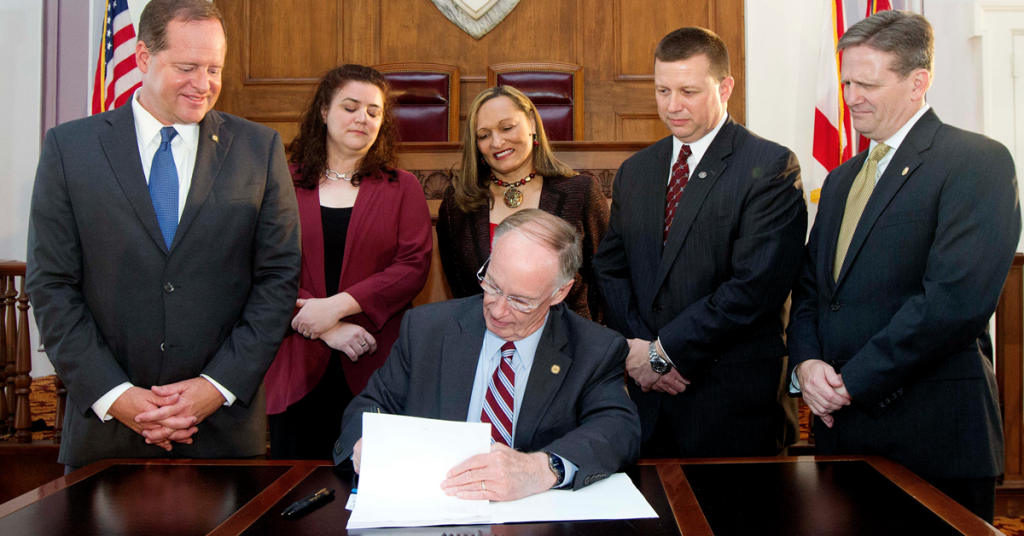
Shelby County Sheriff’s office is confirming that State Senator Cam Ward was arrested Wednesday on a driving under the influence charge. Few details about the incident are known, but Ward’s mugshot is available on the Shelby County Sheriff’s Office inmate listing page under his full legal name Robert Cameron Ward. Ward is among the most active members of the Legislature on social media. His latest tweet was earlier Wednesday: Enjoyed visiting with Bibb Career Academy this afternoon and working with them on tech improvements… https://t.co/xsbKt2mAYW — Cam Ward (@SenCamWard) July 1, 2015 When the news broke, Brian Rell, chief of staff to U.S. Rep. Robert Aderholt’s tweeted: We all make mistakes; it is what we do after making them that counts. @SenCamWard is no different. He has done good things and will do more — brian rell (@brianrell) July 2, 2015 According to WSFA, Senate Majority Leader Greg Reed released a statement Wednesday: “Senator Ward made a mistake. We encourage him to seek help and will be there for emotional and spiritual support.” Beyond the general specifics of the arrest, there are many questions that will clearly be coming as details emerge and others that will take some time to play out: How, if at all, will this affect his Judiciary Committee chairmanship? How, if at all, will this affect all of his efforts on prison reform including his recent appointment by Gov. Robert Bentley. It looks like we will have to wait until Thursday for some basic answers: .@ShelbyCountySO says @SenCamWard will not be released from jail until tomorrow. Still have not heard back from @AlabasterPolice. — Jamie Ostroff (@JamieWIAT) July 2, 2015


